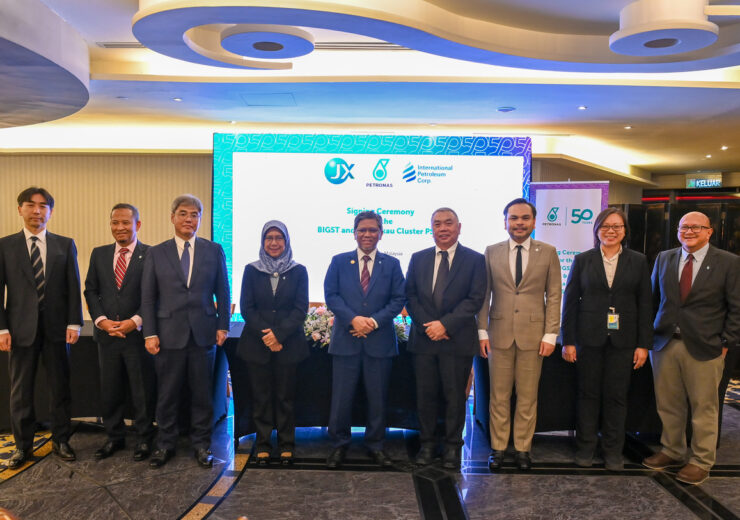The Malaysian oil and gas company awarded the BIGST Cluster to PETRONAS Carigali and JX Nippon Oil & Gas Exploration (BIGST), and the Tembakau Cluster was awarded to IPC Malaysia and IPC SEA Holding

Petronas signs PSCs for BIGST and Tembakau clusters. (Credit: Petroliam Nasional Berhad (PETRONAS))
Petronas, through Malaysia Petroleum Management (MPM), has signed production sharing contracts (PSCs) for two Discovered Resource Opportunities (DRO) clusters offshore Malaysia.
The Malaysian oil and gas company awarded the BIGST Cluster to Petronas Carigali and JX Nippon Oil & Gas Exploration (BIGST), with 50% participating interest each.
The Tembakau Cluster has been awarded to IPC Malaysia and IPC SEA Holding with 90% and 10% participating interest, respectively.
Petronas MPM senior vice president Datuk Ir Bacho Pilong said: “The signing of the BIGST and Tembakau DRO clusters PSCs further reinforce Malaysia’s position as an attractive destination for industry players seeking to grow their energy portfolio and thrive in the energy transition with Malaysia’s differentiated barrels.
“These awards, in addition to the signing of seven new PSCs earlier this year were the result of MPM’s ongoing efforts in promoting Malaysia Upstream and a testament to investors’ confidence in Malaysia’s E&P industry.
“While the development of resources remains crucial to ensure energy security, we are also taking deliberate efforts towards achieving our targets to manage emissions from operations.”
Discovered in the 1970s, the BIGST Cluster comprises five undeveloped high CO2 gas fields, Bujang, Inas, Guling, Sepat and Tujoh.
It was awarded with advanced fiscal terms that attract complex resource monetisation.
BIGST is the first high CO2 gas development in Peninsular Malaysia, incorporating Carbon Capture and Storage (CCS) technology as part of its value offerings.
Tembakau Cluster is a new addition to IPCM’s existing interests in Malaysia and comprises two undeveloped sweet gas fields, Tembakau and Mengkuang.
It was awarded as a Small Field Asset (SFA) PSC, which incorporates a simplified fiscal model and governance process.
The company aims to recover around four trillion standard cubic feet (Tscf) from BIGST and 260 billion standard cubic feet (Bscf) from the Tembakau Cluster.
Petronas said that the gas supply from the fields will support the region’s energy security and will advance the development of other similar fields.
In addition to issuing licenses and managing petroleum arrangements in Malaysia, MPM is shaping the country’s oil and gas industry and steering the petroleum resources development.
In a separate development, Petronas has signed a deal with a Petroleum Sarawak and a Japanese consortium for a proposed carbon capture and storage (CCS) at its depleted M3 offshore field in Sarawak, Malaysia.
Petronas’ affiliate Petronas CCS Ventures signed the agreement with the Japanese consortium, comprising Japan Petroleum Exploration 1662.T and Kawasaki Kisen Kaisha 9107.T.
The consortium will explore feasibility studies of carbon storage sites, starting with M3, along with developing these sites.
Petronas CCS Ventures CEO Emry Hisham Yusoff said: “This collaboration is not just a strategic move to unlock potential CCS opportunities in Sarawak but necessary in addressing climate change as a collective action in achieving a low-carbon future.”
